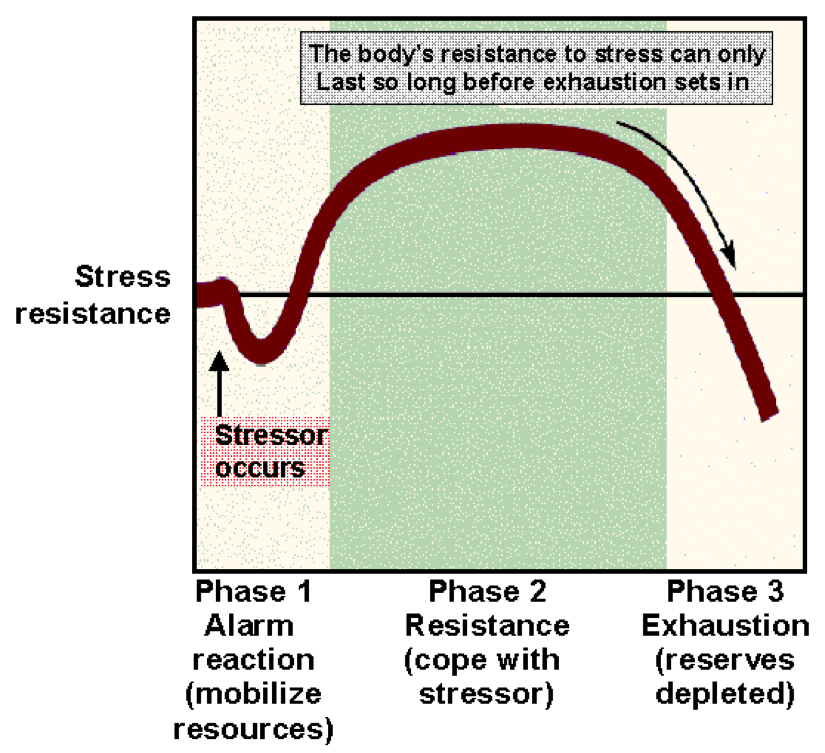STRESS ADAPTATION: Understanding Our Body’s Response to Stress

Hans Selye, an endocrinologist from Vienna, Austria was one of the first to describe how stress affects the body. He even coined the term “stress” that didn’t exist fewer than 100 years ago. He wrote a paper on the topic in 1926, which was published in Nature, a prominent scientific journal. His theory is called the “General Adaptation Syndrome.”
Think about the last time that you felt stressed or pressured. What were the feelings that you had? How did you respond? How did you feel after the feeling of pressure was gone? Selye’s theory was that there is a response produced by three glands in our body: the hypothalamus, the pituitary gland (both in the brain), and the adrenal glands, which are positioned above the kidneys. He hypothesized that a familiar pattern could be evoked by challenges and demands. The reaction prepares the body for “fight or flight.”
Fig. 1: Three Phase of Stress Adaptation: Alarm, Adaptation/Resistance, and Exhaustion

Fig. 1
1. Alarm
Alarm is the first phase of the General Adaptation Syndrome. Acute stress can be caused by significant events such as physical or emotional trauma, shock, starvation, or extreme temperatures. It may be due to inconsiderate drivers, your boss at work, or an unhelpful customer service representative. Inadequate sleep, poor nutrition, drug and alcohol abuse are physical triggers of the Alarm reaction in the body. Even positive events, such as getting married, moving, or having a baby cause stress. During the Alarm phase, there is a massive release of hormones and neurotransmitters in the body. The capability to handle stress is diminished while the body works to mobilize resources to deal with the stressor. During a stressful reaction, blood pressure, blood sugar, heart rate, and respiratory rate all increase. Fear, anxiety, anger, and restlessness are common during the Alarm phase. The reaction during the Alarm phase is often enough to get the body through the stressful event. If a stressor is significant enough at this phase, death can occur.
2. Stress Resistance
Stress Resistance is phase two of the General Adaptation Syndrome. It occurs when the body has been exposed to stress for more than a few hours or days. Although no longer on “high alert,” the body and nervous system are ready for stress. Individuals in the Resistance phase may actually perform better. There is an active effort by the body to restore balance. Mental attributes such as increased confidence, creativity, resourcefulness, and a positive outlook come with Resistance. On the flip side, there may be an effort to isolate and hide from stress, or to “numb the pain.” Glucocorticoids, most importantly cortisol, which increased during the first phase, continue to elevate blood sugar and blood pressure. Most patients treated for “adrenal dysfunction” are in phase two. Cortisol may be high or low which can make someone feel both “tired and wired.” There may be symptoms of insomnia, fatigue, anxiety, irritability, irritable bowel, weight gain, and lowered immunity. This is a really good time to visit a Naturopathic physician who can assist with the right diet, lifestyle changes, nutrients, and herbs to help the body recover.
3. Exhaustion
The last and final phase of Stress Adaptation is Exhaustion. At this point the body has depleted its resources attempting to repair itself. If the stress has passed, recovery occurs. If stress continues, the body will decline in energy and its ability to function mentally. The hormones and neurotransmitters released to overcome the stressor are depleted. Clinically this phase looks like exhaustion. Individuals have no energy no matter how much they sleep. They have difficulty with daily functions such as going to work, taking care of the kids, and cooking dinner. It also results in feelings of depression and hopelessness. It can take a long time to recover from this phase, just as it took a long time to get there.
Exposure to Long Term Stressors
The difference between encountering a stressful situation and recovering, versus existing in a heightened state of readiness, is continued stress. Although there are physical drawbacks to continuous stress because of the elevated levels of cortisol, some people seem to thrive. Those individuals have developed healthy mental attributes which allow them to tackle challenges with confidence. Every individual has a different tolerance for stress. If the level of stress exceeds the individual’s tolerance level it will ultimately lead to exhaustion.
Individuals who are in the midst of chronic stress often turn to maladaptive habits to help them cope. It could be poor eating habits, excess sugar or caffeine consumption, cigarette smoking, alcohol or drug abuse, or social isolation. Not only do these habits not help, but they further deplete the individual and lower their resistance to stress. From a Naturopathic perspective we recommend:
- Prioritizing sleep and exercise (although not too strenuous if energy is low)
- Eating unprocessed foods low in sugar and high in nutrients to help the body to rebuild and recover
- Avoiding caffeine. Meditation is also a helpful tool. It is also important to consider “obstacles to cure” which are the people, situations, or environmental factors which prevent recovery. These factors need to be identified and removed. A comprehensive approach can help improve stress-related symptoms and even increase an individual’s capability to deal with stress.
Dr. Stacey Munro is a Naturopathic physician who specializes in prevention and treatment of chronic health conditions. Following Naturopathic philosophy, she looks for the root cause, rather than just treating symptoms. Dr. Munro prescribes dietary and lifestyle changes, nutritional supplements, herbs, and other natural therapies. Nature’s Helper Medical Clinic 178 Mountain Road, Suffield, CT (860) 758-7808 www.NaturesHelperMedical.com.